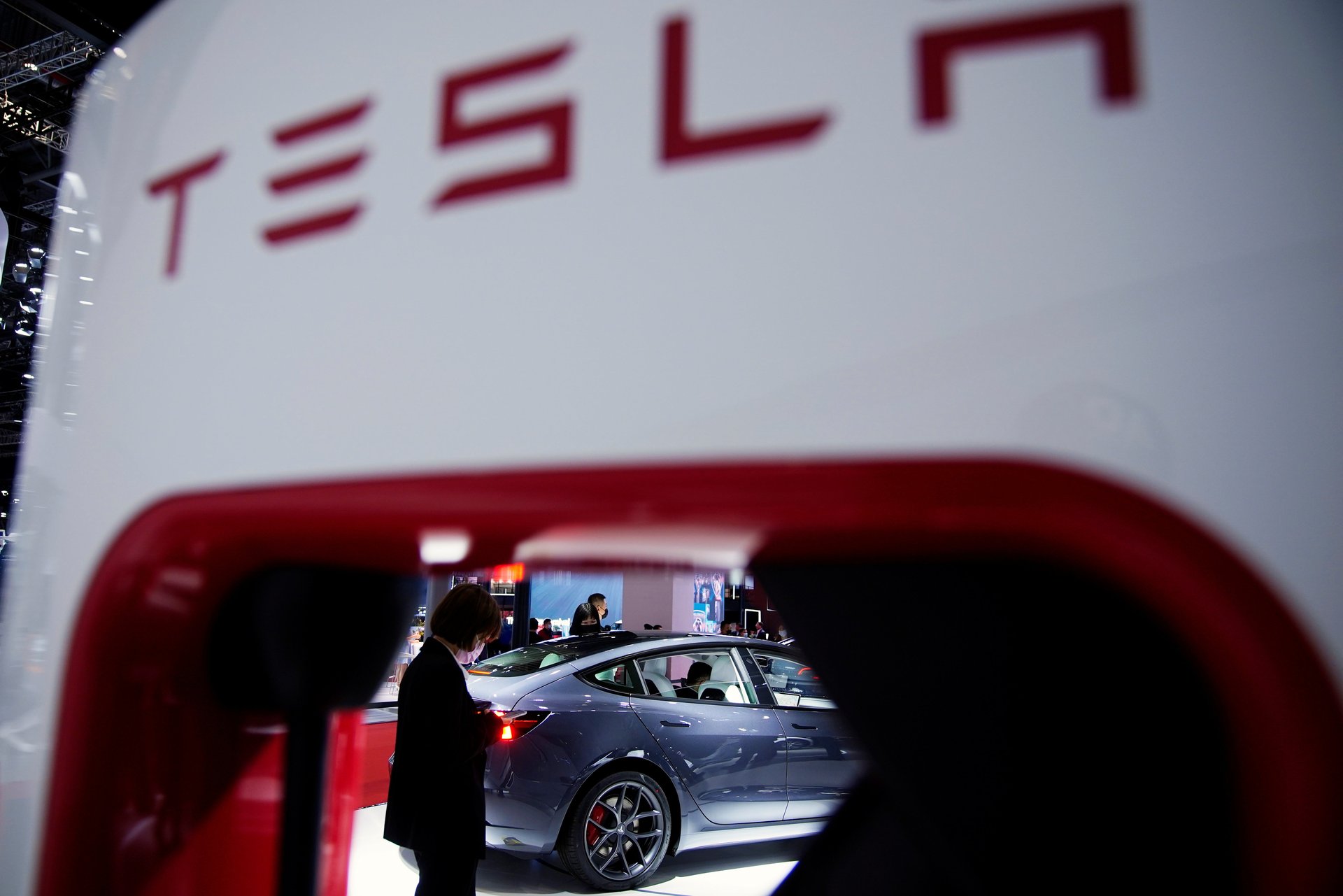Tesla stole the spotlight at China’s premier auto show for all the wrong reasons
This story was updated.


This story was updated.
Tesla made headlines at the Shanghai Auto Show, but not because of new models or features.
Soon after the show opened for press preview on Monday morning (April 19), a Tesla car owner seized the spotlight with her protest against the car maker. Wearing a white T-shirt printed with the Chinese characters “brake failure” and the Tesla logo, the angry woman climbed onto the roof of a red display Model 3, and repeatedly yelled “Tesla’s brakes don’t work.”
She then destroyed the umbrellas of security guards who were trying to conceal her actions from onlookers and was later dragged away by them. The disruption lasted around (link in Chinese) 20 minutes, according to Chinese media Caijing Qiche. Images and videos of the incident uploaded to Chinese social media platforms soon made Tesla the biggest news yesterday at the auto show, which sees the participation of around 1,000 Chinese and international companies at each edition, which alternates between Shanghai and Beijing.
According to a Shanghai police statement today (April 20), the woman, surnamed Zhang, will be detained for five days for “disrupting public order.”
In a statement yesterday on Chinese social media platform Weibo, Tesla said it has been in negotiations with Zhang regarding her allegations that problems with the brakes on her Model 3 caused a crash in February that injured two of her family members including her father who was driving the car at the time, according to Chinese news portal Netease. Zhang was also in the car. The company says it believes the crash was caused by excessive speed. It added that Zhang, who also staged a similar protest last month outside a Tesla store, had rejected the company’s proposal of having her car tested by a third-party agency, as well other solutions it proposed. Zhang’s husband has disputed the firm’s claims, saying the incident was not caused by excessive speed.
Tesla didn’t immediately respond to questions from Quartz.
But amid the claims and counter-claims, the tone of some of Tesla’s remarks has sparked rare anger from Chinese internet users against the company—which has a huge fan base in the country. Grace Tao, a Tesla vice president, told Caijing Qiche after the protest that the company could not bow to Zhang’s requests. In addition to seeking to return the car, Zhang has asked for compensation from Tesla to cover medical bills from the crash, and for mental damage. “We could not fulfill her requests, which are unreasonable…She wouldn’t accept testing of the car but instead asked for a large amount of compensation, we have no reason to meet such a demand,” said Tao.
In its statement yesterday, Tesla echoed that line, and said it wouldn’t give in to “unreasonable demands.”
In response to the remarks, Weibo users told Tesla to “get out of China,” while a comment that has been liked over 20,000 times said the episode has shown the company’s “extreme arrogance.”
It’s a worrying development for Tesla, which has enjoyed a honeymoon period in China at a time when many other foreign companies have faced harsh scrutiny or become the targets of consumer boycotts. Not only is the car popular, and Elon Musk an admired figure, but the government has also gone to lengths to enable the company to set up its own wholly-owned factory in the country, which helped it reach a record $6.7 billion sales there last year. Chinese authorities see Tesla as a “catfish,” an aggressive player that will gobble up its lesser rivals until only the strongest remain. That, they hope, will force China’s EV players to innovate.
But alongside its rise in China, there have been more frequent complaints from consumers about vehicle quality, and more regulatory scrutiny. In February, Chinese regulators summoned its executives to discuss complaints about quality issues, including acceleration irregularities and battery fires.
It’s worth noting that not only consumers but also far more official voices weighed in on the car show incident to issue a warning to the firm.
In a commentary today, state news agency Xinhua said Tao’s remark has shown “no sincerity in solving the problem.” “If a car company cannot provide good quality products and services, cannot ensure the safety of drivers, or even speculates maliciously about the motivation of consumers who defend their rights, it will damage its own brand,” it said.
Even higher up the chain, a social media account of China’s Central Political and Legal Affairs Commission, a part of the Communist Party apparatus that shapes law enforcement policy, sharply criticized Tesla in an article today over its consumer safety complaints. “Tesla has a good performance in China thanks to its citizens, as well as China’s opening up policy. This is the foundation of its development in China. But such trust should not be met with arrogance, or a lack of respect for the Chinese market and consumers,” it said.
Tesla took note.
Late Tuesday night, the company apologized for not solving Zhang’s problem in a timely way. It also struck a far more conciliatory tone than in its earlier remarks, stating that it “respects and firmly abides by the decisions of related government departments, respects consumers, abides by relevant laws and regulations, firmly and resolutely cooperates with investigations of the government.”
Perhaps the honeymoon period is ending.
Update, April 21: This story was updated with details of a subsequent statement in China from Tesla.